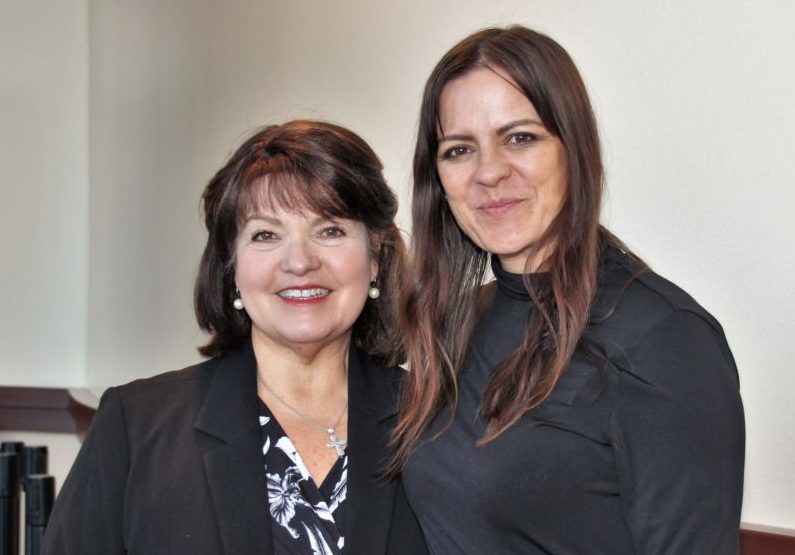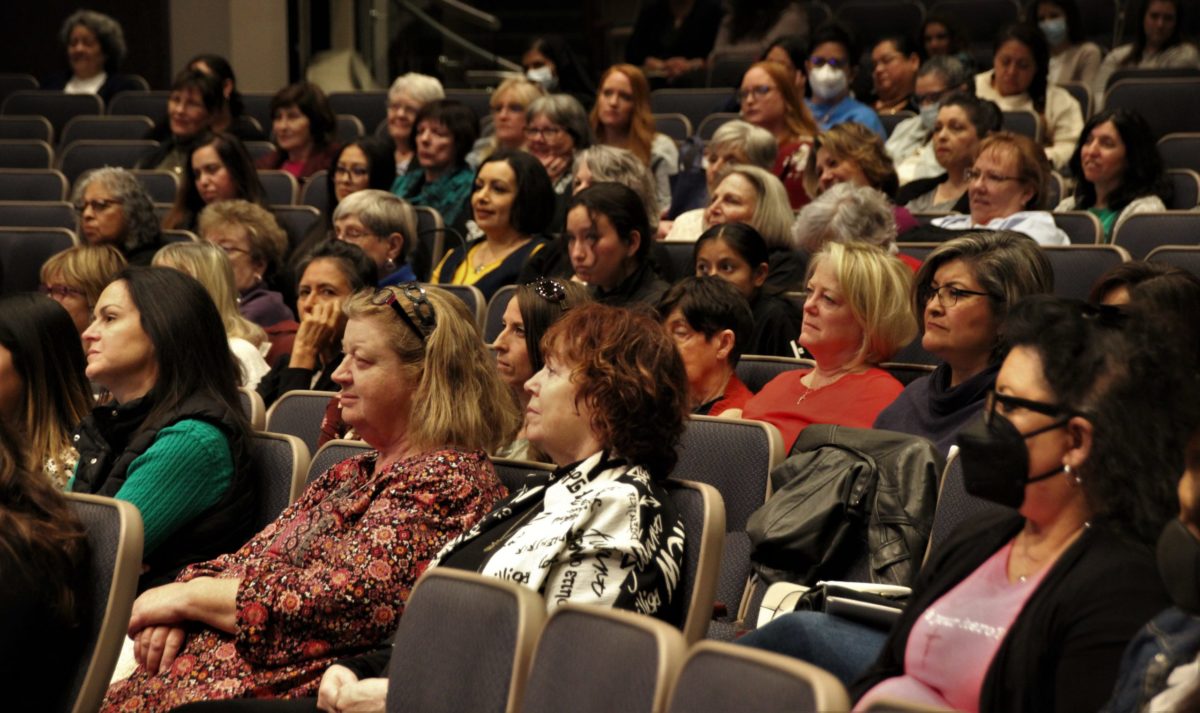By Jeff Grant
PHOENIX — Women from across the Diocese were encouraged in their faith recently through a series of speakers and fellowship during the 11th annual Catholic Women’s Conference sponsored by Catholic Women of Phoenix.
The Jan. 29 gathering at Xavier College Preparatory in central Phoenix drew about 300 women of all ages to the school’s Virginia G. Piper Performing Arts Center, where participants heard a variety of national and local figures offer strategies and inspiration for living their Christian beliefs in a world whose culture increasingly challenges them to do so.
Titled “One Life is All We Have,” the conference also allowed women to spend a day with friends and make new ones, something the pandemic has made difficult.
“Just being here, you feel you’ve come home, in a way, among all these other women,” said Gerianne Heslin, a mother of five grown children ages 22-33 and parishioner at Our Lady of Perpetual Help in Scottsdale. “This is a great shot in the arm.”
Following a welcome from Catholic Women of Phoenix President Roberta Bazuldua, the day began with keynote speaker Noelle Mering discussing Woke culture and how it undermines the Christian faith.
Described by Merriam-Webster as “chiefly U.S. slang,” the dictionary defines Woke as: “Aware of and actively attentive to important facts and issues (especially issues of racial and social justice).” The word has come to represent an embrace of progressive activism.
Author of “Awake, Not Woke: A Christian Response to the Cult of Progressive Ideology,” Mering told the conference Woke has subverted Catholic and Christian beliefs by playing upon the very real and desired faith principle of compassion. “The ideology wins many adherents by operating parasitically off Christian instincts and precepts and seeking to replace them,” she explained. “Pointing to real problems and true injustices prompts us naturally to the sort of compassion that the Christian life truly demands. It appeals to our better natures, then supplies fundamentally destabilizing and dehumanizing answers.”
The growth of Wokism already has done damage, she continued. It has fragmented society and continues to deepen the divide, pitting supporters — who portray themselves as victims of heavy-handed authority — and believers against one another. The Wokist stands in opposition to God’s authority, which is reflected in the family, and embraces community and government order.
“We have destabilized the natural bonds that root and fortify us, and in their absence, we are pulled by the sway of the crowd,” she said.
Further, she said the operating principles of Woke ideology rest on three basic distortions:
“It reduces the person in favor of the group. It corrupts our understanding of a stable human nature by deifying our will. And, it elevates human power over true authority. What is rejected – reason, the person, and authority – are the three characteristics of the Logos that is the reason or mind of God in the person of Jesus Christ, who is author and authority over all,” she continued.
The end result is those who consider themselves “victims” are honored, and the ideology replaces recognition of the individual’s God-given reasoning ability.”
Such is the Woke position that oppression is “at the core” of womanhood. So, as Mering pointed out, the Wokist believes a “woman’s perfection exists in fighting her oppression and striving for power. A woman who is not a feminist is denying something central to her womanhood,” they would argue.
A fellow at the Washington, D.C.-based think tank Ethics and Public Policy Center, Mering said Woke philosophy also preys on the value of compassion, leaving the Christian vulnerable to the flawed thinking.
“From the sexual revolution to the transgender movement, we are told the sexual lives, proclivities and identities of others do not affect us — that love demands we normalize such behaviors and identities,” she said.
Linda Gibson, a grandmother and parishioner at St. Thomas the Apostle in Phoenix, lauded Mering’s talk, saying that Wokism has caused division and pain within her own family. But she said the culture’s effects can be overcome through prayer and perseverance.
“When one person in our family is wounded, we all are wounded. We have truth; God is truth, love, and life. The truth will be what sets us free.”
The next speaker, Christine Accurso, offered practical tips to living one’s faith in the public square by speaking or acting for what is right.
People keep calling our society ‘post-Christian.’ Well, I’m not post-Christian. I am living in Christian society. Until I die, my society is going to be Christian, if I can help it. Our influence is very important,” asserted Accurso, a Gilbert resident and past executive director of First Way Pregnancy Center in Phoenix.
“We are guided by sets of principles. As a Catholic, we live by the Gospel. As an American, we need to know our Constitution. With these and a good prayer life, you’re going to know exactly how to live and thrive as a Catholic in America today,” she continued.
Doing so also requires diving daily into God’s Word.
“If you don’t read the Bible. If you don’t hear the readings at Mass, you’re not going to know what Jesus expects of us. It’s through His parables and what they teach us, that we know how to act.”
Accurso urged her audience to stay informed and be involved.
“We’re not just the hands and feet of Jesus. We are His voice, sometimes, too.
“Use your instincts. For example, if you see something wrong happening in your child’s school, speak up. Don’t make a real big deal about it. Go to the person responsible for the decision, and say, ‘Can you explain this to me? Because that’s not really what I signed up our son to go to your school for.’”
Public meetings are online and can be viewed anytime, she added, noting the schedule challenges many mothers – especially working moms — face.
“Can you imagine if every person in this room took one little thing and acted on it? We would make a loud difference!”
She also urged women to keep their spiritual antenna up.
“The Holy Spirit is not going to speak to you at a designed time every day. The Holy Spirit is going to say what he wants, when He wants.”
The simple, straightforward advice and down-to-earth style reached many in the audience.
“Her talk was very inspirational,” said Angela Filler, a pediatrician, a mother of three grown children, ages 19-29, and parishioner at All Saints in Mesa.
“I admire her willingness to be so open to take the time to engage with people at all levels. I like her willingness to be open to everybody. We are moms with grown children, and I see a lot of missed opportunities for engagement, with regret.”
Still other speakers made impressions as well.
Fr. John Nahrgang, Vicar for Evangelization and Education in the Diocese of Phoenix, at one point said that women can find numerous strong female examples of faith, beginning with the Blessed Mother.
Fr. Nahrgang also said the family has been under attack since before the Fall of Man. In tempting Adam and Eve to violating God’s command against eating from the Tree of the Knowledge of Good and Evil, the serpent worked to divide the first couple by first targeting Eve. Later, he worked to pit brother against brother through Cain’s jealousy toward Abel.
Satan’s lie that man would become like God by eating from the forbidden tree remains very much alive today. Unbelievers often live by their own standards and ideas, “inventing their own terms of good and evil,” he explained.
One of the many manifestations of this is reflected in homosexuality and transgenderism, aberrations of what God created us to be as men and women.
“Our sexuality is a gift of God. We are stewards of that, and with stewardship comes responsibility,” Fr. Nahrgang said.
Afternoon keynote speaker Kathleen Beckman echoed those themes.
The sale of Joseph by his brothers into slavery as yet another example of Satan targeting the family, and she pointed to Mary’s humility, obedience, faith, gratitude and satisfaction with what God has given her as strong examples for women to follow.

Beckman urged her audience to prioritize family, and protect it through prayer and participation in the Sacraments, drilling down into Scripture.
The Diocesan Administrator of Deliverance and Exorcism Ministry in the Diocese of Orange, Calif., for 13 years, Beckman said these weapons in “the Catholic arsenal” are also effective for family healing and restoration. She urged women to “put on the full armor of God,” echoing St. Paul in his letter to the Church at Ephesus (Eph 6:10-18).
During an interview with The Catholic Sun prior to her presentation, Beckman said women who are “not well-Catechized become vulnerable to the loud voices of the world, as well as the flesh.”
The day marked the conference’s return after a 1-year absence. Public-health concerns over COVID-19 cancelled the 2021 event.
Bazuldua said isolation and curtailing of many church activities that allow women to come together was very much on the Catholic Women of Phoenix’s leadership team when assembling its 2022 lineup.
“We (were) focusing on what the last two years have brought out in society and spiritual warfare. Those are two areas we need to know more about and enter the fray with guidance regarding who we are and what we believe. The shutdowns and quarantines placed a lot of responsibility on women’s shoulders. Women needed to rise to that occasion in a different way than men. We had to form our families in a time when we couldn’t get to church and had no Religious Ed classes.
“Most of all, because we are the ‘hearts’ of the home, women had to step up in big way. Many had to do this with grieving hearts because we lost so many people in this pandemic. We hold pain a little differently.”
Participants acknowledged the challenges of pandemic life and their drive to persevere despite its limits.
“You have to get up really early, I mean 5, y’know? You have to be alert, get your spiritual antenna up,” commented Gerianne Heslin. “I think the Mass; receiving the Eucharist is absolutely key. You have to start over every day. The rosary is one of your greatest weapons as well. If I don’t do that every day, it’s a mess.”
Her friend, Angela Filler, saw the motherly challenges from a different perspective at her medical office.
“When schools were shut down, it was extremely taxing on the parents, moms trying to work from home, teach their kids from home, it was chaotic. In my practice, I see a lot of anxiety, depression, a tremendous increase in weight, tremendous amount of obesity over the last 2 years, kids finding ways to cope with carrying out their roles in a confined setting,” the pediatrician explained.
Others cited the role of women in forming their children’s faith.
“You have to instill your values, teach them. You can’t rely on the schools to do it, or even the Church. You have to do it. It has to come from your household and your family. If you don’t, they’re going to learn it somewhere that you don’t want them learning it,” said Adrienne McGurran, a mother of two children, 8 and 11, and parishioner at St. Mary Magdalene, Gilbert.
“It is so important to have the Catholic community to strengthen you and hold you accountable. You learn from them, and they learn from you. It’s impossible to be alone.
It’s very important. …to support one another as we go through life’s trials…to be there to support one another, to pray for one another and to help each other…to have somebody to talk to as our kids grow up and go through life experiences; to share knowledge or wisdom…to teach them our ways, the right ways, the Catholic ways,” she said.
“My faith is here.”






